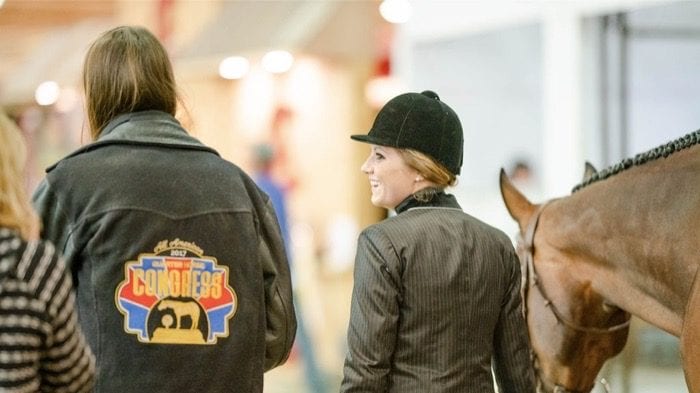The equine industry is a small world; seemingly everyone knows everyone. This close contact can make tensions run high between ex-trainers and ex-clients, especially when attending the same shows. Sometimes the switch between programs is mutually decided and smooth. Other times, this transition can be quite messy. How do you juggle the awkwardness between you and your ex-trainer? Or the tension between you and your ex-client?
No matter the situation, it is crucial to conduct yourself with class and kindness. You do not have to be best friends with every person you meet, but try to be polite.
Here are some tips to keep in mind next time you run in to “that” person at a show.
Say “hi” or smile
Allowing the awkward silence to continue makes the situation more uncomfortable. Acknowledge the “elephant in the room” and say “hi” or ask, “How are you?” A word or two can make an extreme difference at the show by breaking the silent tension.
Trainer Brent Maxwell suggests, “If there’s a lot of tension, it never hurts to say hello in passing. Life’s too short to hold a grudge. It will get easier when the pride gets out of the way.”
It may be challenging to speak to this person but try to bridge that awkward gap. This does not mean that you have to have a long conversation with the person, but acknowledging their existence is always appreciated. Holding a grudge only causes more tension and drama overall.
Exhibitor Nicole Kuklinski suggests, “Keep it short and simple, such as ‘Hi, how are you?’ Or ‘Congratulations (if it’s in order).’ I would recommend exiting by saying something along the lines of ‘nice seeing you, take care, or see you around.'”
Maybe you do not feel that speaking to this person is beneficial for either of you, then smile. Smiling is entirely free and does not require any speaking. This diplomatic effort acknowledges the other person and helps lessen the tension. You do not want to make the show uncomfortable for your other trainer/clients, so attempt to remain graceful and confident.
Extend an olive branch (if possible)
This one depends on the situation on a case-by-case basis. Sometimes relationships are unsalvageable and should remain that way for everyone’s sanity. However, if you and your ex-trainer/ex-client had a falling out over a minute event, extend an olive branch.
This surely does not mean you have to become their client or trainer again, but at least attempt to make the environment at shows less awkward. You can do this by smiling, asking how their day is, etc. It takes a lot of energy to carry resentment and anger.
“When a new client worries about their old trainer/clients, I tell them to focus on our instructions and be friendly,” says trainer Gretchen Mathes. “Take the high road and it will all go away in time.”
Let that negativity go and move forward. Remember that it does not cost anything to be kind.
Communicate
Communication is key. Horse trainers are not mind readers; they cannot always tell when you are unsatisfied or upset. Therefore, it is crucial that you talk to them about your concerns. Keep an open line of communication with your clients and their new trainers if warranted.
“Horse trainers offer a service, just like your doctor, mechanic, and many other services that you deal with every day,” Brent stresses. “When a client has some concerns regarding their animal, personal performance, or any other issues that may arise, I recommend making an appointment with your trainer/trainers to discuss any problems or concerns you may have, the same you would do with anyone else that you pay a service fee. This needs to be done when the problem first arises and opens a line of communication between the client and the trainer.”
If you are not happy, your horse and trainer are not satisfied either. Mathes says, “We try to split ways by helping to place them elsewhere before it gets unbearable. There is not much sense in keeping a customer who can never be happy.”
Early action is crucial when you feel a change is necessary. Often when these splits are messy, it is understandable to want to start a conflict. However, resist this urge and focus on your happiness.
Maxwell advises, “When a new or potential client comes to me to discuss the possibility of changing training programs, I am very adamant about the client knowing that should they decide to move their animal(s) to our farm, they need to have a conversation with their current trainer. I will then contact that trainer to discuss the change and to make sure that they have been paid for their services and any or all shared equipment is in the right hands.”
Don’t be defensive
It is always possible that the tension-filled air will result in an uncomfortable conversation. If you encounter this, approach the talk with poise. Keep the discussion short and straightforward. Do not become increasingly more accusatory and cause an even bigger scene. Also, do not confuse standing up for yourself and being defensive. Here are some differences between the two:
Being Defensive
Shouting, cursing, etc.
Assuming the other person knows your perspective
Automatically accusing
Defending Oneself
Using a calm tone
Communicating your point-of-view
Supporting your viewpoint with facts
Just have fun showing your horse
Most exhibitors show horses to have fun. Often, the barn is an escape from the hustle and bustle of reality. Not everyone is going to be your best friend and biggest supporter. You have to remember why you started showing horses in the first place.
“For most, showing is a hobby, says Kuklinski. “Therefore, it should be fun. Don’t let negativity, stress, or awkward tension bring you down.”
Do not allow someone else’s negativity or lack of morals control your equine experience. To have fun showing your horse, you must be honest with yourself and your trainer. You are in control of your happiness and how you interact with others. Ignore the negativity and enjoy exhibiting your horse.









